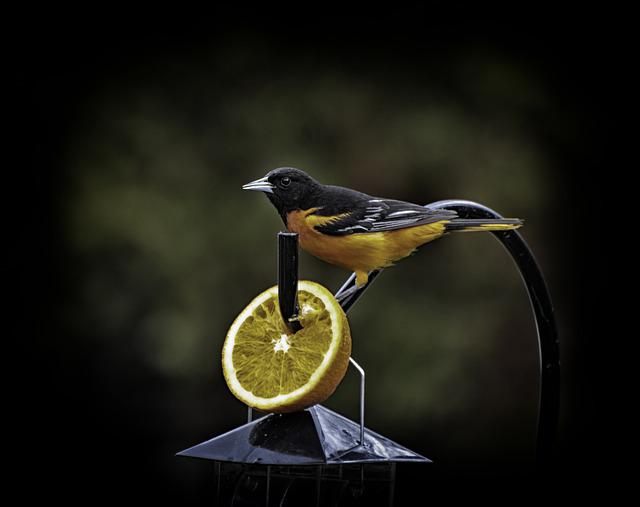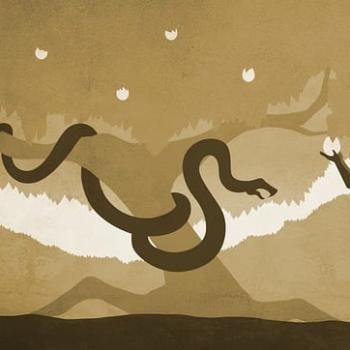
I went to the garden to pick peppers.
Something yellow and black flitted out of the weeds over the Four Sister patch, too quickly for me to see what it was, as I rounded the corner. Was it a Swallowtail butterfly? Or a bumblebee, a gigantic one as big as my fist?
As I got closer, two more of the same creature flew away, and I got a closer look. They were Baltimore orioles, gold and black birds, one of my grandfather‘s favorites. They were after the trumpet vines which annoy me– a jungle of impossible tangles for a few bright orange flowers. Orioles like sweet things. Next year I will leave out plates of fruit for them, if we’re still here.
I thought of that most glorious line from Mary Oliver’s “Wild Geese“, as I so often do when I look at birds: You do not have to be good. You do not have to walk on your knees for a hundred miles through the desert repenting. You only have to let the soft animal of your body love what it loves.
That line haunts me.
I have always tried so hard to be good.
The great big mammoth gray stripe sunflower is all but dead. It’s bent over like a candy cane under the weight of that giant center, a mandala of seeds as big as a serving platter. I’m going to give it to my friend the witch, to feed her chickens, when I come back to Columbus. The other five Mammoth Gray Stripes are blooming. They’re not quite so tall as the giant one. I wondered if they would ever bloom at all, but now is their time. And there must be a hundred flowers on the Lemon Queens and the Red Velvet. The garden was noisy with the hum of the bees.
You do not have to be good, sang the bees.
The summer squash is all but spent, but the winter squash is just getting started. The tomatoes are heavy with green fruit and there’s exactly one shiny orb that’s orange, nearly red, nearly ready. There are sweet peppers everywhere I look. The first of the rattlesnake beans are ripe on the corn stalks.
Sometimes I’m amazed that I did this: this, a garden, a great big one, food for myself and the neighbors, sunflowers with eyes as big as serving platters, a feast for the bees. I shouldn’t be this powerful. I’m nobody. I’m a fat sickly woman of nearly forty with a chronic illness and constant anxiety. I don’t do things. Things happen to me. But somehow I got a wheelbarrow and then I got a shovel and then the seed packets came in the mail, and then there was a garden, and it’s alive, and it’s making food and beautiful flowers to look at.
Everyone needs something in their lives to remind them that they are powerful. The community garden is my power trip. It’s something I do that makes me feel happy and reminds me that I have agency. Without a garden, I feel helpless.
That put me in mind of my family again, and the whole meltdown last month.
All it took was me saying “no.”
Not even “no,” technically speaking. What I said was “We’re working on it, Granny.” but I meant “no.” No, you may not spiritually abuse my daughter. I’m not going to drive six hours to stay with relatives who think I’m crazy, under the critical eye of my tyrant of an aunt, so that Adrienne can put on a show for them. I’m not going to stuff Adrienne in a confessional with some priest I’ve never met before so she can become a statistic. I’m not going to dress her up for a photo op First Holy Communion that will make her panic and melt down to soothe my granny’s religious scruples. No. You can’t hurt my daughter.
I let the family hurt me a thousand times. I let my mother bully me to the point of suicidal ideation before I tried to set boundaries, and then finally went no contact because boundaries wouldn’t be respected. Even then, I let her visit me when Adrienne was born, just to make peace. She didn’t like that and she walked out. That was her choice. I tried to keep the channels of communication open with my grandmother and some of my aunts, even though they scared me, even though I knew they didn’t like me, even though they said such awful things. I placated Granny every time she was rude to me about not being the kind of Catholic she wanted me to be. I responded politely when she wrote that I should “dump the chump” and go stay with them at the family reunion. I responded with a “thank you” when my aunt called me selfish and entitled for communicating with Granny privately instead of in letters she could intercept. I tried to make peace even though it stung. But they weren’t allowed to hurt my daughter.
I let the Catholic Church hurt me far more than a thousand times. I went to confession even after it triggered panic attacks. I ignored my sexuality and pretended to be somebody I wasn’t. I gripped the pew and closed my eyes and breathed through panic attacks at Mass to meet my Sunday obligation, even though it triggered flashbacks to the Charismatic Renewal. I internalized the dire prophecies that were supposed to make us safe. I prayed to be a victim soul because it sounded like something God wanted. I even let someone cinch a chain on my wrist. But I refused let them hurt my daughter.
And that was the end. I was disowned. I’ll never see my family again. Granny stopped sending the gifts she sent to help with the rent. That was all they could do and they did it. They’re gone.
That happened because I love Adrienne.
What if I loved myself?
What would happen if I kept people and institutions from hurting me, with the same zeal I have when I keep people and institutions from hurting my daughter?
I’ve heard other people raised in cults far more repressive than the Charismatic Renewal say the same thing: what if I could love myself? Would I be able to stop people from abusing me, if I loved myself? And I’ve been thinking about it for the longest time.
Now I’ve gone and proved that love is indeed powerful, and I can wield it.
I guess I’ll see where we go from here.
I filled a bag with sweet peppers and left them on the fence for a neighbor to enjoy.
I went home, contemplating.
Another line from that same Mary Oliver poem comes to mind:
| Whoever you are, no matter how lonely, |
| the world offers itself to your imagination, |
| calls to you like the wild geese, harsh and exciting – |
| over and over announcing your place |
| in the family of things. |
image via Pixabay
Mary Pezzulo is the author of Meditations on the Way of the Cross, The Sorrows and Joys of Mary, and Stumbling into Grace: How We Meet God in Tiny Works of Mercy.
Steel Magnificat operates almost entirely on tips. To tip the author, visit our donate page.













